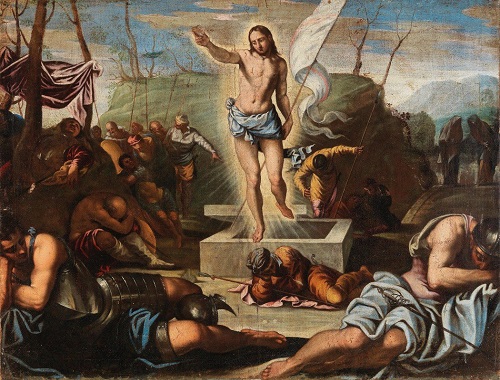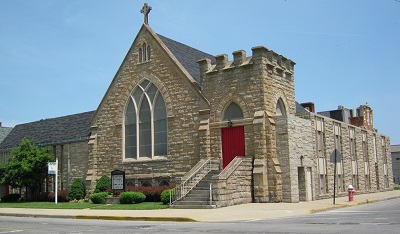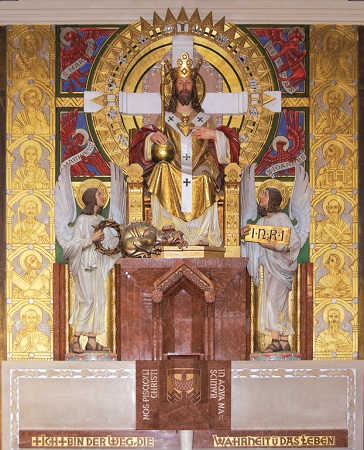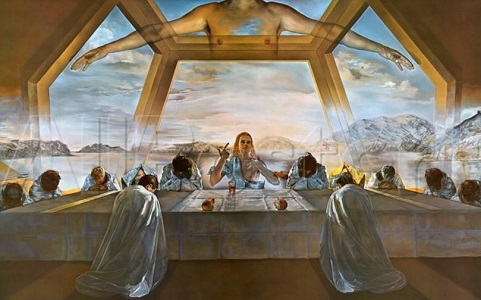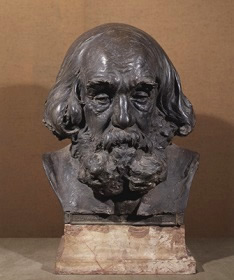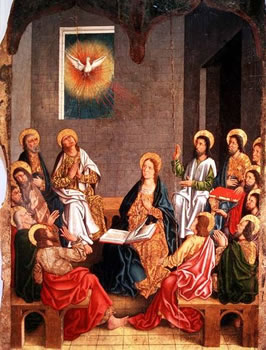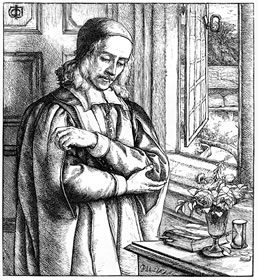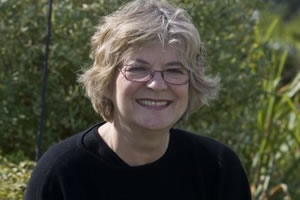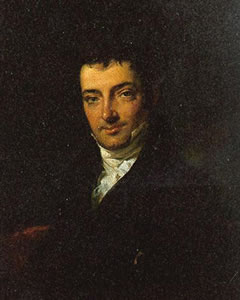De Vlaamse dichter en schrijver Charles Ducal (pseudoniem van Frans Dumortier) werd geboren in Leuven op 3 april 1952. Zie ook mijn blog van 3 april 2008.
Lolo
Wij lagen verscholen op zolder
in de ban van haar onwaarschijnlijkheid,
een oerbeeld, buitgemaakt op een foto.
De hele nacht dronken en rookten wij
om denkbaar te blijven in onze verbeelding,
waarin zij als onmogelijk verscheen,
de moeder-godin, als koe bekeken,
de borsten gespannen en ideëel.
Later leerde ik zelf hoe hopeloos
de zuiverheid van deze vorm,
maar toen was ik jong en droomde
ervan iets te schrijven, zo groots
dat het eigenlijk niet kon.
Avondgebed
Wind en regen sloten de vensters.
Wij zaten geknield bij de haard
in de godsdienst die wij zouden erven.
De vrouw die ons had gebaard
zei formules om ons te verkleinen.
Haar stem zeurde taai in de nek.
Wij zaten stom, pas ingewijden.
De man die ons had verwekt
hief de hand. Wij boden het hoofd.
Hij prentte zijn duim in de hersens.
Wind en regen bestookten de droom.
Onder bed sliepen wolven en heksen.
Charles Ducal (Leuven, 3 april 1952)
De Nederlandse dichter en schrijver Frederik van Eeden werd geboren in Haarlem op 3 april 1860. Zie ook mijn blog van 3 april 2007 en ook mijn blog van 3 april 2008.
Kunt Gij nog wreder slaan!
Kunt Gij nog wreder slaan! – mijn God! mijn God!
Zie, ik ben sterk en breken zal ik niet,
Maar was er één die Gij zó lijden liet,
Wijl hij U lief had, boven zielsgenot?
En nóg zal ik niet vloeken ’t mensbestaan,
En ’t Leven niet, en Uwe naam niet smaden,
Zelfs met dít mateloze Leed beladen,
Neem ik het Leven uit Uw handen aan.
Maar schrijf dan ook, ter keerzij mijner schuld,
Dat ééns een menskind, zó diep in ellende,
Zó ver verloren in een nacht van rouw,
De maat zijns droeve Levens heeft vervuld,
En schoon hij ’t bitterst dezer wereld kende,
Toch durfde leven en niet sterven wou!
Schemering in ’t woud
Hier moet ik peinzend gaan en stil, –
het afgeleefde loof kwijnt aan de twijgen,
ik voel de lome schemer stijgen –
en stijgen, stil.
Wat glanst het bleke Westen koud!
een matte lach uit droeve wolkenbrauwen
doet flauw de teed’re nevel blauwen
in ’t gélend woud. –
Ik zie de bleke stervenswenk.
Ik voel het doffe duister in mij dringen
en verre stemmen hoor ik zingen
al wat ik denk. –
Waar zijt ge, Dood? – zo gij rondom
op wieken van de schemering komt rijzen,
nu doet uw nadering niet ijzen, –
ik wacht u – kom!
Frederik van Eeden (3 april 1860 – 16 juni 1932)
De Duitse dichter Peter Huchel werd geboren in Lichterfelde bij Berlijn op 3 april 1903. Zie ook mijn blog van 3 april 2007 en ook mijn blog van 3 april 2008.
Abschied
Daß du nun willst gehen,
hast du es bedacht,
als du meine H[1]nde
löstest in der Nacht?
Als wir noch im Schlummer
hielten uns vereint –
meinen Namen hauchend,
hast du mich gemeint?
War der Mond nicht Zeuge,
silbern überm Haus?
Kam nicht Wind vom Meere,
löschte alles aus?
Daß du nun willst gehen,
hast du es bedacht,
als du meine Augen
suchtest in der Nacht?
Frühe
Wenn aus den Eichen
der Tau der Frühe leckt,
knarren die Türen, rädern die Speichen
vom Schrei der Hähne geweckt.
Noch unterm Laken
des Mondes schlafen die Wiesen, kühl und hell.
Die Sumpffeuer blaken,
die Frösche rühren ihr Paukenfell.
Mondhörnig schüttelt
sein Haupt das Rind
und weidet dunkel am Bach.
Der Habicht rüttelt
im stürzenden Wind
die Helle der Lerchen wach.
Peter Huchel (3 april 1903 – 30 april 1981)
De Nederlandse schrijver, dichter en columnist Adriaan Jaeggi werd geboren op 3 april 1963 in Wassenaar. Zie ook mijn blog van 3 april 2008 en ook mijn blog van 10 juni 2008.
Wolfgang en ik
Ik hoor dat Mozart
is teruggekeerd op aarde
en ik mag hem rondleide
n
Hij schrikt van de auto’s
Op straat loopt hij
met zijn handen op zijn oren
We gaan een café in
Ik zeg daar is het stiller
We hebben geen geluk
de jukebox gilt en de mensen
Mozart kijkt om zich heen
Waar zit dat orkest
In die kast, wijs ik
en leg hem in tien woorden
het principe van de cd
en de laserstraal uit
Er komt een meisje naar ons toe
Wie is je vriend, vraagt ze
Wolfgang, dit is
hoe heet je eigenlijk
een paar uur later bij haar thuis
sta ik dorstig op van het bed
in de keuken staat Mozart
het licht aan en uit te knippen
Adriaan Jaeggi (3 april 1963 – 10 juni 2008)
De Amerikaanse schrijver Edward Everett Hale werd geboren op 3 april 1822 in Roxbury, Massachusetts. Als schrijver werd hij bekend toen hij in 1859 in de Atlantic Monthly zijn verhaal “My Double and How He Undid Me” publiceerde. Al gauw verschenen er meer van zijn korte verhalen in dit tijdschrift. Het bekendste daarvan is „The Man Without a Country“ (1863). In het verhaal “The Brick Moon”, geeft hij als eerste een beschrijving van een satelliet.
Uit: The man without a country
„I cannot give any history of him in order; nobody can now; and, indeed, I am not trying to. These are the traditions, which I sort out, as I believe them, from the myths which have been told about this man for forty years. The lies that have been told about him are legion. The fellows used to say he was the “Iron Mask”; and poor George Pons went to his grave in the belief that this was the author of “Junius,” who was being punished for his celebrated libel on Thomas Jefferson. Pons was not very strong in the historical line. A happier story than either of these I have told is o
f the War. That came along soon after. I have heard this affair told in three or four ways,—and, indeed, it may have happened more than once. But which ship it was on I cannot tell. However, in one, at least, of the great frigate-duels with the English, in which the navy was really baptized, it happened that a round-shot from the enemy entered one of our ports square, and took right down the officer [pg 026] of the gun himself, and almost every man of the gun’s crew. Now you may say what you choose about courage, but that is not a nice thing to see. But, as the men who were not killed picked themselves up, and as they and the surgeon’s people were carrying off the bodies, there appeared Nolan, in his shirt-sleeves, with the rammer in his hand, and, just as if he had been the officer, told them off with authority,—who should go to the cockpit with the wounded men, who should stay with him,—perfectly cheery, and with that way which makes men feel sure all is right and is going to be right. And he finished loading the gun with his own hands, aimed it, and bade the men fire. And there he stayed, captain of that gun, keeping those fellows in spirits, till the enemy struck,—sitting on the carriage while the gun was cooling, though he was exposed all the time,—showing them easier ways to handle heavy shot,—making the raw hands laugh at their own blunders,—and when the gun cooled again, getting it loaded and fired twice as often as any other gun on the ship. The captain walked forward by way of encouraging the men, and Nolan touched his hat and said,—„

Edward Everett Hale (3 april 1822 – 10 juni 1909)
De Engelse priester en dichter George Herbert werd op 3 april 1593 geboren, waarschijnlijk te Black Hall (Wales). Zie ook mijn blog van 3 april 2007 en ook mijn blog van 3 april 2008.
Prayer
Prayer the Churches banquet, Angels age,
Gods breath in man returning to his birth,
The soul in paraphrase, heart in pilgramage,
The Christian plummet sounding heav’n and earth;
Engine against th’Almightie, sinners towre,
Reversed thunder, Christ-side-piercing spear,
The six-daies world-transposing in an houre,
A kinde of tune, which all things heare and fear;
Softnesse, and peace, and joy, and love, and blisse,
Exalted Manna, gladnesse of the best,
Heaven in ordinarie, man well drest,
The milkie way, the bird of Paradise,
Church-bels beyond the starres heard, the souls bloud,
The land of spices; something understood.
George Herbert (3 april 1593 – 1 maart 1633)
De Amerikaanse schrijver Washington Irving werd geboren op 3 april 1783 in Manhattan, New York. Zie ook mijn blog van 3 april 2007.
Uit: A History of New York
„Let us suppose, then, that the inhabitants of the moon, by astonishing advancement in science, and by profound insight into that lunar philosophy, the mere flickerings of which have of late years dazzled the feeble optics, and addled the shallow brains of the good people of our globe-let us suppose, I say, that the inhabitants of the moon, by these means, had arrived at such a command of their energies, such an enviable state of perfectibility, as to control the elements, and navigate the boundless regions of space. Let us suppose a roving crew of these soaring philosophers, in the course of an aerial voyage of discovery among the stars, should chance to alight upon this outlandish planet.
And here I beg my readers will not have the uncharitableness to smile, as is too frequently the fault of volatile readers when perusing the grave speculations of philosophers. I am far from indulging in any sportive vein at present; nor is the supposition I have been making so wild as many may deem it. It has long been a very serious and anxious question with me, and many a time and oft, in the course of my overwhelming cares and contrivances for the welfare and protection of this my native planet, have I lain awake whole nights debating in my mind, whether it were most probable we should first discover and civilize the moon, or the moon discover and civilize our globe.”
Washington Irving (3 april 1783 – 28 november 1859)
Buste door Friedrich Beer, 1885, in New York
De Duitse schrijver Josef Mühlberger werd geboren op 3 april 1903 in Trautenau in Böhmen. Zie ook mijn blog van 3 april 2007.
Uit: Besuch bei Kafka
“Ich habe Ihren Schatten erkannt”, sagte Kafka, führte mich über den Hof und durch eine schmale türlose Öffnung in dem Mauerwall und lud mich mit dem Worten “Der Heraufstieg wird Sie ermüdet haben” zum Sitzen auf einer Bank ein, die aus herausgefallenen Steinen aufgebaut war. Das Licht war hell, die Stelle, wo wir saßen, schattenlos, die Steine der Bank sonnenwarm. Auf dem Mauerabhang des Walles kletterten und schliefen goldgrün funkelnde Eidechsen.“
Josef Mühlberger (3 april 1903 – 2 juli 1985)
Zie voor onderstaande schrijvers ook mijn blog van 3 april 2007.
De Duitse koopman en schrijver Friedrich Emil Rittershaus werd geboren op 3 april 1834 in Barmen.
